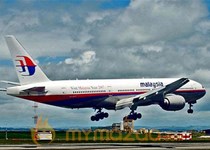The mystery over the missing Malaysian jetliner deepened on Wednesday as Malaysia's air force chief denied earlier remarks that the plane had reversed course and reached the Strait of Malacca before disappearing more than four days ago.
The missing Boeing 777 may have turned back from its original route toward Vietnam before it vanished from radar, but there is no evidence it reached the Strait of Malacca, air force chief Gen. Rodzali Daud said Wednesday, suggesting confusion at the highest level over where the plane might be.
Daud was quoted as saying in local media report Tuesday that the military had radar data showing the plane had turned back from its original course, crossed the country and made it to the Strait of Malacca to the west of Malaysia. The Associated Press contacted a high-level military official, who confirmed the remarks.
In a statement, Daud denied saying the remarks, and referred to a statement he made March 9 in which he said the air force has "not ruled out the possibility of an air turn back" and said search and rescue efforts had been expanded in this regard.
Authorities began their search for the missing aircraft at the position it was last reported to be over the sea between Malaysia and Vietnam. But they have also said search operations were ongoing in the Malacca strait.
Daud told a news conference on Wednesday that Malaysia's military radar detected what could have been the missing jet in an area at the northern end of the Strait of Malacca, but stressed that the information needed to be corroborated, Reuters reported.
Adding to the confusion, Indonesia air force Col. Umar Fathur said the country had received official information from Malaysian authorities that the plane was above the South China Sea, about 10 nautical miles from Kota Bharu, Malaysia, when it turned back toward the strait and then disappeared. That would place its last confirmed position closer to Malaysia than has previously been publicly disclosed.
Fathur said Malaysia authorities have determined four blocks to be searched in the strait, which Indonesia was assisting in.
With no debris found yet, authorities have not ruled out any possible cause, including mechanical failure, pilot error, sabotage or terrorism. The plane disappeared early Saturday en route to Beijing from Kuala Lumpur with 239 people on board.
Authorities had earlier said the plane, which took off at 12:20 a.m. and was headed to Beijing, may have attempted to turn back to Kuala Lumpur, but they expressed surprise that it would do so without informing ground control.
The United States has sent two Navy ships, at least one of which is equipped with helicopters, and a Navy P-3C Orion plane with sensors that can detect small debris in the water. It said in a statement that the Malaysian government has done a "tremendous job" organizing the search efforts, which involve 40 planes and ships from at least 10 nations.
Malaysian authorities contacted their Indian counterparts Tuesday seeking help in widen the search to an area near the Andaman Sea, Indian Ministry of External Affairs spokesman Syed Akbaruddin said Wednesday.
Akbaruddin said India had appointed a contact person to liaise with Malaysian authorities, but did not give details about what kind of help India would offer.
"This is a new development," Akbaruddin said, referring to the search extending to the Andaman Sea, north of the Strait of Malacca. "The two sides were working out what specifics they want, and what we can assist in."
Vietnamese military authorities said they were searching for the plane on land sea.
Lt. Gen. Vo Van Tuan, deputy chief of staff of Vietnamese People's Army, said there were 22 aircraft and 31 ships from Vietnam and other countries involved in the hunt in its area of responsibility.
Frustrated relatives of some of the passengers on the flight claim that they have been able to call the cellphones of the missing travelers, but no one has picked up. Hugh Dunleavy, the commercial director at Malaysia Airlines, also said the airline heard ringing tones when it tried to call the crew members, the Straits Times reports.
But Malaysia Airlines spokesman Ignatius Ong dismissed the claims, saying he tried calling one of the phones five times and “got no answering tone,” according to News.com.au. He added that the airline’s command center had no luck either.
Relatives have not taken up “financial assistance” deals from Malaysia Airlines, who are offering around $5,000 to the families of each missing traveler.
“We’re not really interested in the money,” one relative told AFP, according to The Guardian. “It is all about the people -- the people on the plane. We just want them back.”
Malaysia Airlines also said it is investigating an Australia television report that the co-pilot on its missing flight had invited two women to stay in the cockpit for a flight two years ago.
Jonti Roos described the encounter on the program "A Current Affair." It aired multiple still photographs from Roos that showed the women inside the cockpit and the pilots apparently working the plane's controls.
The airline said late Tuesday it wouldn't comment about the report until its investigation is complete.
Roos said Fariq Abdul Hamid and the second pilot talked to her and her friend in the cockpit during the entire flight in December 2011 from Phuket, Thailand, to Kuala Lumpur.







